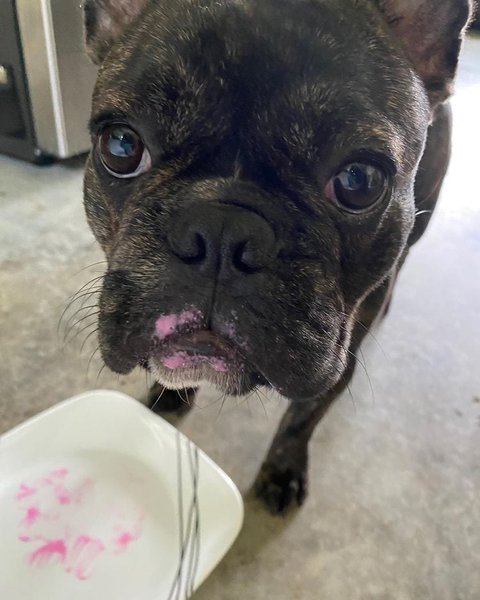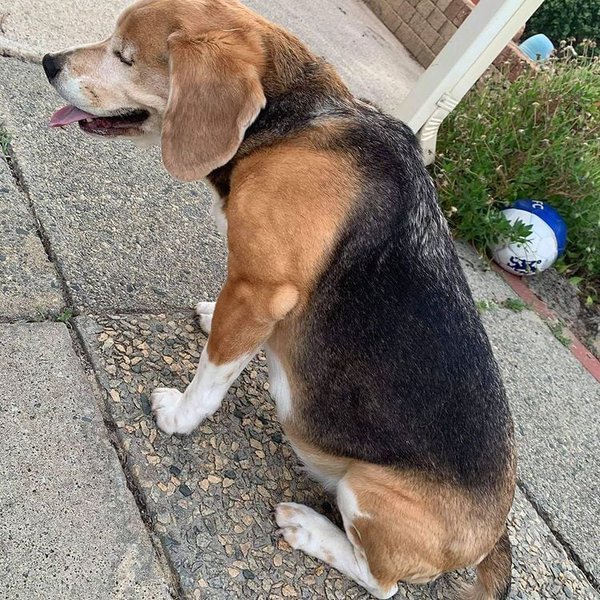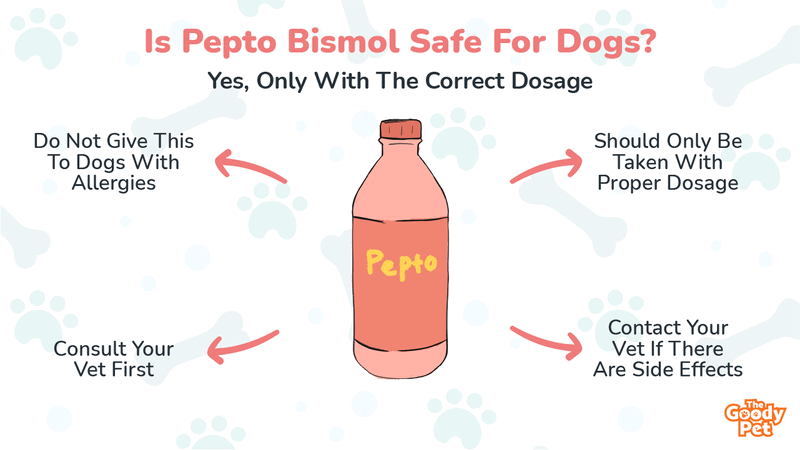Canine upset stomachs are a common problem, and often times owners reach for Pepto-Bismol to help their pup feel better. But is it safe to give Pepto-Bismol to dogs?
Pepto-Bismol is generally safe for dogs when used as directed. Only give only the recommended dosage based on your dog’s weight. Do not give Pepto-Bismol to puppies or dogs with certain medical conditions. Finally, stop giving Pepto-Bismol and contact your veterinarian if your dog experiences any side effects.
Let’s further explore the safety of Pepto-Bismol in dogs.
Is Pepto-Bismol Safe For Dogs?
As we have already noted in the intro, it’s safe to use Pepto-Bismol for treating stomach issues in canines.
However, it’s not as straightforward as it sounds.
First, always get exclusive permission from your vet before using Pepto-Bismol.
Secondly, Pepto-Bismol only works for minor stomach upsets or issues. If your dog is experiencing severe and prolonged stomach problems, it could be a sign of a more serious underlying issue. Get the pooch to the vet immediately for more assistance.
When Is Pepto-Bismol Bad For Dogs?
Certain conditions may make the administration of Pepto-Bismol for dogs risky.
First, if your dog is already on other types of medications, do not give it Pepto-Bismol unless you’ve talked it through with a vet.
This helps to prevent the risk of serious drug interactions that could cause dangerous health issues for the pooch.
Additionally, dogs that suffer from other medical conditions do not qualify for Pepto-Bismol.
It is also advisable to avoid Pepto-Bismol if your dog is hypersensitive or allergic. Pooches with a sensitive digestive tract will also respond negatively to Pepto-Bismol.
Hypersensitive dogs require a more personalized treatment regimen, something that can only be prescribed by a vet.
Can A Dog Overdose On Pepto-Bismol?
Yes, there is always a risk of overdose when using medication and Pepto-Bismol is not any different. A good rule here would be to make Pepto-Bismol a last resort solution. Remember most stomach problems tend to go away on their own after some time. Additionally, always use Pepto-Bismol in small recommended doses.
Pepto-Bismol Dosage: What Kind Of Pepto Can I Give My Dog?

There is actually no standard Pepto-Bismol dosage for dogs.
The dosage depends on a wide variety of factors including the pooch’s breed, weight, health, age, and others.
Nonetheless, according to the American Kennel Club, the recommended liquid Pepto-Bismol dosage is 1 teaspoon for every 10 pounds of body weight.
You are also advised to administer each dose 6 – 8 hours apart.
Despite this, we still must insist that proper dosage should only be prescribed by a vet. Just to be on the safe side, have a professional vet look at your four-legged buddy, and recommend a dose.
So, typically, there are two main types of Pepto-Bismol. They include the liquid suspension and the chewable tablets. It is important to note that any of these options work just as effectively as the other.
However, some dogs prefer chews over liquid and vice versa. It all depends on the preferences of your four-legged furry friend. Nonetheless, the dosage varies a lot. Here is a simple breakdown.
Chewable Tablets
Chewable tablets are often easier to administer compared to liquid Pepto-Bismol. According to Health Paws Pet Insurance, a dosage of 8.5 grams per pound of body weight is fine. But you still need to talk it through with your vet.
Liquid Suspension
As for those of you using liquid Pepto-Bismol, 1 teaspoon for every 10 pounds of body weight should be ideal. Again, this is just a recommended dose. For a more personalized option, talk to your vet.
What Causes Upset Stomach In Dogs?

An upset stomach in dogs is often caused by common indigestion problems. This is basically when the pooch is not able to process food as effectively as it should.
However, other causes, such as infections and parasites, may come into play.
Here is a complete breakdown of some of the most common causes of stomach issues in dogs:
Diet Changes
Sudden changes in diet will more often than not cause stomach upsets in your pooch. This however goes away once the dog gets used to the new food. But in some cases, it may last for a long time.
Parasites
Dogs afflicted with parasites such as giardia, hookworm, whipworm, and others may also experience stomach problems. The parasites may also have negative long-term effects on the pooch’s digestive tract.
Food Sensitivity
Food sensitivity is also a common cause of stomach upsets in dogs. However, this only affects hypersensitive dog breeds.
Poisoning
Poisoning will also cause digestive issues in dogs. It’s not uncommon for canines to eat or chew on substances that contain potentially toxic chemicals like pesticides and other household cleaning items, being the little vacuum cleaners they are.
These chemicals are not only dangerous to the long-term health of the dog but will cause a tummy ache.
Viral Infections
Your dog will also experience an upset stomach if they are exposed to certain viral infections. Viruses, such as parvo and distemper, in particular, are known to cause indigestion in pooches. They are also very deadly so make sure you see a vet as soon as possible.
In some cases, stomach upsets could be a symptom of a bigger more serious underlying problem. A good rule would be to have the pooch inspected by a vet regularly to rule out any other serious issues.
How Do You Know If Your Dog Has Digestive Problems?

Several signs could suggest your four-legged furry friend is having digestive or stomach issues. However, it is always important to get a professional opinion from a vet before starting any treatment regimen.
Nonetheless, here are some of the most common symptoms of stomach issues in dogs:
Loss Of Appetite
Loss of appetite can be a symptom of many things, including serious underlying health problems in the pooch. But it is also a very common indicator of indigestion and other stomach-related afflictions in dogs.
Vomiting
If your dog is vomiting a lot of late, it could mean that they have an upset stomach. But just like the loss of appetite, vomiting could also be a sign of additional health issues for your pooch. This is why we keep insisting on a vet visit before you start any treatment.
Constipation
Dogs that have trouble digesting food are more likely to experience constipation. If your pooch is having trouble pooping, then chances are they are having tummy issues.
Excess Gas
Gas is common in canines. But once it becomes too much, then it means your four-legged furry friend is having trouble with digestion.
Excess gas is often caused by the type of diet the dog is eating. It is also relatively easier to treat compared to other symptoms.
Other common signs to look out for include diarrhea, blood in the stool, and general discomfort. If you see one or more of the symptoms above, talk to your vet right away.
What Else Can I Give My Dog For An Upset Stomach?

Before you decide to treat your pooch’s upset stomach with over-the-counter medication, you may want to try out a few remedies first. Here are some of them:
Fasting
In most cases, indigestion and stomach upsets in dogs are caused by food. Sudden changes in diet and food poisoning are in particular very culpable. In that case, it may be a good idea to stop feeding the pooch until the stomach upset has passed.
You see, an upset stomach is simply the pooch’s reaction to unwanted food in the belly. Once the dog has finally managed to pass out these unwanted foods, then the discomfort will go away. Feeding the dog more and more food while they are trying to get rid of the unwanted stuff will be extremely counterproductive.
Use Ice Cubes For Hydration
When your pooch is experiencing diarrhea and vomiting, it means that they are losing a lot of valuable water. Keeping them hydrated is extremely important. But instead of using normal water, consider giving the pooch some ice cubes instead. Water has the potential of making the situation worse so avoid it completely.
Canned Pumpkins
Canned pumpkins are commonly used by many vets to treat indigestion in canines. However, make sure it’s 100% all-natural canned pumpkin for the best results. Do not also add any seasoning to the food. Just serve it as it is. It will help your pooch get through the upset stomach faster.
If none of these alternatives work, you can consider using over-the-counter medication. But make sure you visit the vet first.
Related Questions
How Long Does Pepto-Bismol Take To Work?
Pepto-Bismol will take at most 24 hours in dogs. However, this depends entirely on the severity of the stomach upset. In extremely severe cases, the medication will take longer to achieve results and may require more than one dose at any given time. But eventually, it will work for your dog.
How Long Does An Upset Stomach Last In Dogs?
It takes one to two days for a mild stomach upset to go away and more than two or three days for a severe case. However, the use of over-the-counter medication and other homemade remedies can help accelerate recovery times for your dog.
Should I Starve My Dog If He Has Diarrhea?
Yes, you should. It may sound cruel at first, but starving the pooch for 24 hours would go a long way in helping them get rid of the unwanted food causing diarrhea. However, make sure you hydrate the dog using ice cubes for the entire duration of the fasting.





